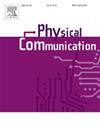Aperture selection approaches for robust NLOS-UV communication in turbulent channels
IF 2
4区 计算机科学
Q3 ENGINEERING, ELECTRICAL & ELECTRONIC
引用次数: 0
Abstract
In this research, we investigate aperture selection schemes for non-line-of-sight ultraviolet communication systems operating in log-normal atmospheric turbulence channels. The proposed approaches involve the selection of a single transmit and/or receive aperture from a pool of transmit and/or receive apertures for communication, based on maximizing the signal-to-noise ratio along the corresponding optical path. To further improve the performance of non-line-of-sight ultraviolet links, we incorporate an optically pre-amplified PIN photo-detector at the receiver and an optical booster amplifier at the transmitter. We consider all noise sources, including those arising from amplified spontaneous emission due to optical amplifiers. We derive closed-form outage and bit-error-rate expressions and conduct diversity gain analyses to assess the performance. Monte Carlo simulations are employed to validate the accuracy of our derivations. The results reveal that selection diversity schemes offer full diversity gain and outperform multiple-input-multiple-output non-line-of-sight ultraviolet systems without aperture selection. Our study demonstrates the efficacy of aperture selection as well as optical amplifiers in enhancing the reliability and performance of non-line-of-sight ultraviolet communication systems in turbulent atmospheric conditions.

求助全文
约1分钟内获得全文
求助全文
来源期刊

Physical Communication
ENGINEERING, ELECTRICAL & ELECTRONICTELECO-TELECOMMUNICATIONS
CiteScore
5.00
自引率
9.10%
发文量
212
审稿时长
55 days
期刊介绍:
PHYCOM: Physical Communication is an international and archival journal providing complete coverage of all topics of interest to those involved in all aspects of physical layer communications. Theoretical research contributions presenting new techniques, concepts or analyses, applied contributions reporting on experiences and experiments, and tutorials are published.
Topics of interest include but are not limited to:
Physical layer issues of Wireless Local Area Networks, WiMAX, Wireless Mesh Networks, Sensor and Ad Hoc Networks, PCS Systems; Radio access protocols and algorithms for the physical layer; Spread Spectrum Communications; Channel Modeling; Detection and Estimation; Modulation and Coding; Multiplexing and Carrier Techniques; Broadband Wireless Communications; Wireless Personal Communications; Multi-user Detection; Signal Separation and Interference rejection: Multimedia Communications over Wireless; DSP Applications to Wireless Systems; Experimental and Prototype Results; Multiple Access Techniques; Space-time Processing; Synchronization Techniques; Error Control Techniques; Cryptography; Software Radios; Tracking; Resource Allocation and Inference Management; Multi-rate and Multi-carrier Communications; Cross layer Design and Optimization; Propagation and Channel Characterization; OFDM Systems; MIMO Systems; Ultra-Wideband Communications; Cognitive Radio System Architectures; Platforms and Hardware Implementations for the Support of Cognitive, Radio Systems; Cognitive Radio Resource Management and Dynamic Spectrum Sharing.
 求助内容:
求助内容: 应助结果提醒方式:
应助结果提醒方式:


